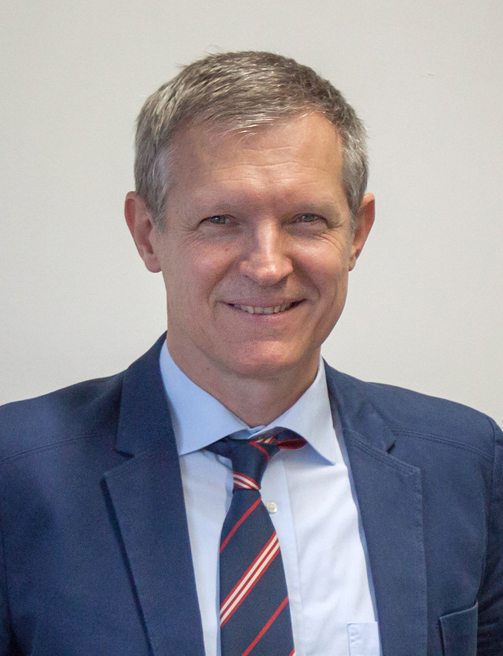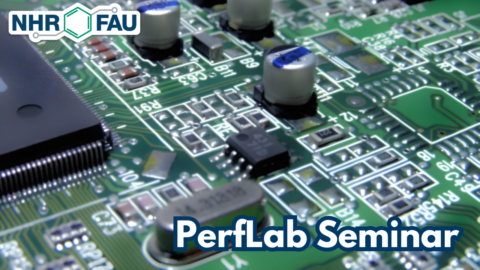NHR PerfLab Seminar: (Re-)Configurable Processor Arrays On-Chip—Low Energy/High Performance Loop Nest Acceleration (Hybrid)
Speaker: Prof. Dr. Jürgen Teich, Department of Computer Science, Friedrich-Alexander-Universität Erlangen-Nürnberg (FAU)
Date and time: Tuesday, July 22, 2025, 2:00 p.m. CEST
Place: RRZE Seminar Room 2.049 or Zoom: https://go-nhr.de/perflab-seminar
Video (fau.tv via IdM login)
Abstract:
Semiconductor technology has advanced so fast in the last decade, allowing for the integration of 100 and more processing elements (PEs) on a single chip. In many applications of high-performance computing and embedded systems, parallel on-chip computing is considered essential to achieve also a high energy efficiency. In order to support the acceleration of a wide class of nested loop program applications, tightly-coupled arrays of programmable light-weight processing elements provide the most promising match.
In the first part of this talk, we discuss the need of a highly intertwined co-design of architecture and compiler for loop nests. E.g., in order to save a substantial amount of energy, data locality of the variables must be preserved during compilation and match the local interconnect between processing elements. We also study the use of block partitioning in order to be able to map also huge loop nests to schedules of accelerator-matched function calls so to achieve scalability.
The second part of the talk is dedicated to tightly coupled processor arrays (TCPAs), a class of massively parallel arrays of locally interconnected PEs, as well as corresponding compilation concepts. The PEs of a TCPA possess a special, yet tiny instruction set and a tiny local instruction memory. Different to coarse-grain reconfigurable arrays (CGRAs), they enable the parallel execution of iterations of multiple rather than just the innermost loop for many computationally intensive applications. Besides introducing the main architectural building blocks of TCPAs, the presentation covers the corresponding steps and transformations in application mapping, which starts from a functional programming language and involves symbolic loop compilation. Finally, the talk presents a concrete TCPA chip design called ALPACA that has been recently designed and manufactured in 22 nm technology by our group.
Short Bio:
 Jürgen Teich (Fellow, IEEE) received the M.S. (Dipl.-Ing.) degree (Hons.) from the University of Kaiserslautern, Germany, in 1989, and the Ph.D. (Dr.-Ing.) degree (summa cum laude) from the University of Saarland, Saarbrücken, Germany, in 1993. From 1998 to 2002, he was a Full Professor with the Electrical Engineering and Information Technology Department, University of Paderborn, Paderborn, Germany. He is with Friedrich-Alexander-Universität Erlangen- Nürnberg, Erlangen, Germany, where he has been directing the Chair for Hardware/Software Co-Design, since 2003.
Jürgen Teich (Fellow, IEEE) received the M.S. (Dipl.-Ing.) degree (Hons.) from the University of Kaiserslautern, Germany, in 1989, and the Ph.D. (Dr.-Ing.) degree (summa cum laude) from the University of Saarland, Saarbrücken, Germany, in 1993. From 1998 to 2002, he was a Full Professor with the Electrical Engineering and Information Technology Department, University of Paderborn, Paderborn, Germany. He is with Friedrich-Alexander-Universität Erlangen- Nürnberg, Erlangen, Germany, where he has been directing the Chair for Hardware/Software Co-Design, since 2003.
From 2010-2022, he has been the Principal Coordinator of the Transregional Research Center 89 “Invasive Computing” funded by the German Research Foundation (DFG). He has edited two textbooks on Hardware/Software Co-Design and a Handbook on Hardware/Software Co-Design (Springer). His current research interests include electronic design automation of embedded systems with emphasis on hardware/software codesign, reconfigurable computing, and multicore systems. Dr. Teich is a member of the Academia Europaea, the Academy of Europe, the National Academy of Science and Engineering (acatech), and the German Society of Humboldtians.
For a list of past and upcoming NHR PerfLab seminar events, please see: https://hpc.fau.de/research/nhr-perflab-seminar-series/

